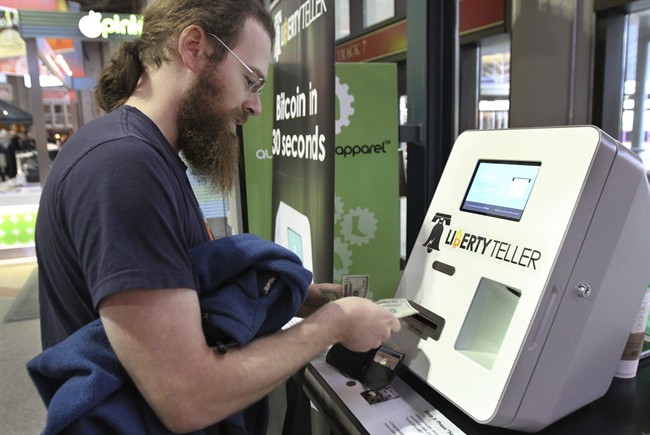The Bitcoin spike that attracted many neophytes to the digital currency market late last year is now officially a dive. The world’s most famous cryptocurrency, which reached a price peak of nearly US$20,000 (C$25,600) in mid-December, is now trading at US$11,000 (C$13,560), a 45 per cent drop. Other well-know digital tokens, such as Ethereum, aren’t faring much better.

READ MORE: Bitcoin plunges amid crackdown fears
So who are the Canadians left holding the crypto bag?
Data on digital currency ownership is hard to come by in Canada, as in most other countries. But what little surveying has been done points clearly in one direction: Young men.
READ MORE: Bitcoin is crashing – and selling it is not easy
For example, while only seven per cent of Ontarians reported any crypto ownership in November, that share increased to nearly 30 per cent among men between the ages of 18 to 34, according to a survey conducted by Innovative Research Group for the Ontario Securities Commission (OSC).
That number “stood out for us, and is an area we are exploring further,” said Tyler Fleming, director of the OSC’s Investor Office, in an email to Global News. “From our work with investors and fintech businesses we knew this was an area young men gravitated toward, and now have hard data which confirms this.”
The OSC data is in line with a 2016 survey by the Bank of Canada (BoC), which found that men are more likely to own Bitcoin and younger people more likely to own some.
WATCH: Bitcoin 101 – what is it and how does it work?

Why boys like cryptos

Get weekly money news
The gender divide in the digital currency market may reflect differences between men’s and women’s approach to money.
“Men are much more likely to self-assess their investment knowledge as good or excellent, which could be a sign of overconfidence,” Fleming said. “Our research has also shown that women are more likely to seek out the help of an advisor.”

But the results from the OSC survey raise questions about whether crypto owners actually have a firm grasp of digital currency markets.
Over half of 18 to 34 year olds believed cryptocurrencies to be as risky or less risky than most investments, according to the OSC survey.
That assessment flies in the face of cryptocurrencies’ extreme volatility. Bitcoin’s latest slide, for example, dwarfs the 9-per-cent drop recorded by the S&P 500 at the height of the 2008 financial crisis. Since 2011 alone, Bitcoin experienced over 60 drops of 9-per-cent or more, according to Campbell Harvey, professor of finance at Duke University’s Fuqua School of Business.
Additional risks include “lack of regulatory oversight, and in some cases, potential fraud,” Fleming said. “For some coin and token offerings, investors may not receive any shareholder or contractual rights in the instance something goes wrong.”
BoC Governor Stephen Poloz recently called Bitcoin trading a speculative bet or “gambling,” an assessment that reflects that of every financial expert Global News has spoken to.
READ MORE: Winklevoss twins are now Bitcoin billionaires. What that means for the rest of us
According to the BoC, while Canadians with a college or university education are more likely to be aware of Bitcoin, “ownership, on the other hand, is correlated with a high-school education.”
While there’s nothing wrong with some Canadians placing a small bet on cryptocurrencies, “I certainly hope this is not their only asset,” Harvey said. People should only buy cryptocurrencies with funds they can afford to lose without palpable consequences, Harvey told Global News in a previous interview.
READ MORE: Bitcoin for Canadians: Where to buy it – and the taxes you’ll pay
Luckily, the amount of money Canadians have poured into Bitcoin appears relatively small, so far. According to the BoC survey, the typical crypto owner held around 0.5 of one bitcoin at the end of 2016, worth roughly $500 at the time. Around a third of Bitcoin users held less than $100.
And while circumstances may have changed since over a year ago, the Canadian situation seems a far cry from South Korea, where a national obsession with digital coins is spurring a regulatory crackdown.
WATCH: More B.C. home-sellers accepting Bitcoin

“Currently, adoption of crypto-currencies is very low in Canada, so it’s too early to say what regulation would look like,” said Josianne Ménard, senior media relations consultant at the BOC, in an email to Global News.
READ MORE: Why Canada is poised to become a prime destination for Bitcoin mining
While Governor Poloz recently referred to the need for cryptocurrencies in a CNBC interview, he was speaking about “regulations by the broader policy community – i.e. beyond Canada,” Ménard said.
“If and when the day comes when regulation is needed, it would be incumbent on the federal government, with the Bank in an advisory role, to think about what would be the right way to treat that currency,” she said.








Comments
Want to discuss? Please read our Commenting Policy first.